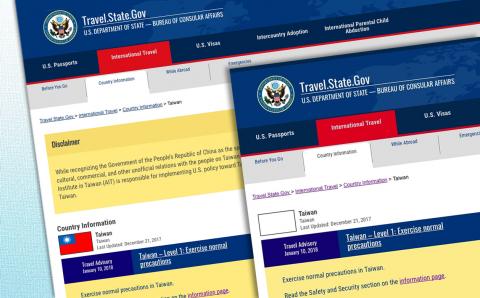The Ministry of Foreign Affairs yesterday expressed its disappointment over the removal of the Republic of China (ROC) flag from several US government Web sites, saying it has conveyed its grave concerns to Washington.
The ministry made the remarks hours after the Chinese-language United Daily News reported the disappearance of the ROC flag from the Web sites of the US Department of State’s Bureau of Consular Affairs and the Office of the US Trade Representative that displayed the flag on their introduction pages for Taiwan.
The newspaper published screenshots of the Taiwan introduction page on the US trade office’s Web site, one from June last year and the other from Tuesday, to show the removal of the flag.

Screen grab from the Bureau of Consular Affairs’ Web site
The US Department of State made the change on its Web site in September last year.
The ministry talked to the US about the matter several months ago, ministry spokesman Andrew Lee (李憲章) told a news conference in Taipei.
“That is why we found the latest flag removal from the Web sites of the two US government agencies not only unthinkable, but also unacceptable and disappointing,” Lee said, adding that Taipei has expressed its serious concerns to Washington.
The US had previously repeatedly reassured the ministry that Taiwan-US ties remained solid and that there was no shift in its policy, Lee said.
“However, we believe that such cases [the removal of the ROC flag] could influence the Taiwanese public’s perception of the status of relations between the two nations,” he said.
The ministry has taken note of Beijing’s increased attempts to use its “sharp power” to squeeze Taipei’s space within international organizations and oppress Taiwan on the supposedly free and open Internet, Lee said.
Such attempts are not conducive to the development of cross-strait ties, Lee added.
“Sharp power,” a term coined by the US-based National Endowment for Democracy, a non-profit organization that promotes democracy, refers to authoritarian efforts to “influence their target audiences by manipulating or distorting the information that reaches them.”
American Institute in Taiwan spokeswoman Sonia Urbom reiterated that the US’ policy toward Taiwan has not changed.
“The United States remains committed to our ‘one China’ policy based on the three joint communiques and the Taiwan Relations Act,” Urbom said.

INVESTIGATION: The case is the latest instance of a DPP figure being implicated in an espionage network accused of allegedly leaking information to Chinese intelligence Democratic Progressive Party (DPP) member Ho Jen-chieh (何仁傑) was detained and held incommunicado yesterday on suspicion of spying for China during his tenure as assistant to then-minister of foreign affairs Joseph Wu (吳釗燮). The Taipei District Prosecutors’ Office said Ho was implicated during its investigation into alleged spying activities by former Presidential Office consultant Wu Shang-yu (吳尚雨). Prosecutors said there is reason to believe Ho breached the National Security Act (國家安全法) by leaking classified Ministry of Foreign Affairs information to Chinese intelligence. Following interrogation, prosecutors petitioned the Taipei District Court to detain Ho, citing concerns over potential collusion or tampering of evidence. The

‘FORM OF PROTEST’: The German Institute Taipei said it was ‘shocked’ to see Nazi symbolism used in connection with political aims as it condemned the incident Sung Chien-liang (宋建樑), who led efforts to recall Democratic Progressive Party (DPP) Legislator Lee Kun-cheng (李坤城), was released on bail of NT$80,000 yesterday amid an outcry over a Nazi armband he wore to questioning the night before. Sung arrived at the New Taipei City District Prosecutors’ Office for questioning in a recall petition forgery case on Tuesday night wearing a red armband bearing a swastika, carrying a copy of Adolf Hitler’s Mein Kampf and giving a Nazi salute. Sung left the building at 1:15am without the armband and apparently covering the book with a coat. This is a serious international scandal and Chinese

Seventy percent of middle and elementary schools now conduct English classes entirely in English, the Ministry of Education said, as it encourages schools nationwide to adopt this practice Minister of Education (MOE) Cheng Ying-yao (鄭英耀) is scheduled to present a report on the government’s bilingual education policy to the Legislative Yuan’s Education and Culture Committee today. The report would outline strategies aimed at expanding access to education, reducing regional disparities and improving talent cultivation. Implementation of bilingual education policies has varied across local governments, occasionally drawing public criticism. For example, some schools have required teachers of non-English subjects to pass English proficiency

TRADE: The premier pledged safeguards on ‘Made in Taiwan’ labeling, anti-dumping measures and stricter export controls to strengthen its position in trade talks Products labeled “made in Taiwan” must be genuinely made in Taiwan, Premier Cho Jung-tai (卓榮泰) said yesterday, vowing to enforce strict safeguards against “origin laundering” and initiate anti-dumping investigations to prevent China dumping its products in Taiwan. Cho made the remarks in a discussion session with representatives from industries in Kaohsiung. In response to the US government’s recent announcement of “reciprocal” tariffs on its trading partners, President William Lai (賴清德) and Cho last week began a series of consultations with industry leaders nationwide to gather feedback and address concerns. Taiwanese and US officials held a videoconference on Friday evening to discuss the